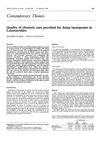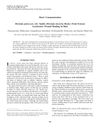Search
for
Sort by
Research
180-210 / 1000+ results
research Quality of Obstetric Care Provided for Asian Immigrants in Leicestershire
Asian immigrant mothers in Leicestershire need better obstetric care to reduce higher perinatal mortality risks.

research Multiple Sclerosis: Side Effects of Interferon Beta Therapy and Their Management
The article suggests managing interferon beta therapy side effects in MS with dose adjustments, medications, and patient education.

research Morinda Pubescens J.E. Smith (Morinda Tinctoria Roxb.) Fruit Extract Accelerates Wound Healing in Rats
Morinda pubescens fruit extract helps wounds heal faster in rats.

research The Use of Dermal Papilla Cells in Studies of Normal and Abnormal Hair Follicle Biology
Dermal papilla cells are key for hair growth and could help us understand and treat hair loss.

research A Practitioner's Guide to Hair Loss Part 1: History, Biology, Genetics, Prevention, Conventional Treatments, and Herbals
The document concludes that hair loss is influenced by genetics and other factors, and while treatments like finasteride can help, they have limitations and side effects.

research Causes and Management of Pica Disorder Among Central Iraqi Peoples
Pica disorder in central Iraq is mainly found in females and is linked to low iron levels; treatment with iron improves most patients.

research Acquired Immunogenicity of DNA After Modification with Malondialdehyde in Patients with Alopecia Areata
Malondialdehyde-modified DNA may trigger an immune response in alopecia areata patients.

research Analytical Chemistry Studying Historical Pharmaceuticals and Health Care Formulations
Analytical chemistry helps understand the makeup and use of ancient medicines, but it's complex and challenging.

research Flavonoids in Safflower Extract Reduce Cisplatin-Induced Damage to Human Follicle Dermal Papilla Cells by Inhibiting DNA Damage and Rad17/Chk1/Cdc25C Signaling
Safflower extract helps protect hair follicle cells from damage caused by chemotherapy.
research Hair Corticosterone Measurement in Mouse Models of Type 1 and Type 2 Diabetes Mellitus
New hair growth corticosterone levels are higher in diabetic mice, indicating long-term stress.
research The Causes of Hair Loss in Women Aged 20-30 Years
Hair loss in women aged 20-30 is often linked to deficiencies in Vitamin D, zinc, ferritin, and haemoglobin, as well as low SHBG levels in those with irregular periods.

research Identification of a New Plant Extract for Androgenic Alopecia Treatment Using a Non-Radioactive Human Hair Dermal Papilla Cell-Based Assay
A new plant extract from Avicennia marina could potentially be used to treat common hair loss.

research Phytochemistry and Pharmacological Studies of Glycyrrhiza Glabra: A Medicinal Plant Review
Licorice has many health benefits but more research is needed to fully understand them.
research Vitiligo After Diphencyprone for Alopecia Areata
DPCP treatment for alopecia areata can sometimes cause vitiligo.

research Pharmacological and Phytochemical Updates on Citrullus Colocynthis and Citrullus Lanatus
Citrullus colocynthis and Citrullus lanatus have potential health benefits but may also cause reproductive toxicity.
research A Comprehensive Review on Deep Eutectic Solvents and Their Use to Extract Bioactive Compounds of Pharmaceutical Interest
Deep eutectic solvents are eco-friendly and effective for extracting useful pharmaceutical compounds.

research External Genitalia Abnormalities in Male Rats Exposed In Utero to Finasteride, a 5α-Reductase Inhibitor
Finasteride exposure in pregnancy causes genital abnormalities in male rats.

research The History of the Development of Minoxidil
Minoxidil was first made for high blood pressure, but it was later found to help hair growth.

research Experimental and Clinical Pharmacology of Ziziphus Jujuba Mills
Ziziphus jujuba Mills may have health benefits, but more research is needed to confirm its safety and effectiveness.

research Sulforaphane Promotes Murine Hair Growth by Accelerating the Degradation of Dihydrotestosterone
Sulforaphane may help with hair growth by breaking down a hormone that causes hair loss.

research Effects of Dermatological Medications on Male Fertility
Some dermatological medications can impair male fertility, so consult a doctor before trying to conceive.

research Clinical Diagnostic Criteria and Complex Therapy Telogene Alopecia in Women
Biotin tablets and shampoo effectively stop hair loss and restore hair function in women.

research Laser-Assisted Hair Regrowth
Fractional lasers could help hair regrowth in androgenic alopecia, but more research is needed to confirm their effectiveness and safety.

research A Pilot Study of a Grape Seed Procyanidin Extract for Lung Cancer Chemoprevention
Grape seed extract may safely and effectively help prevent lung cancer.

research A Semisynthetic Approach for the Simultaneous Reaction of Grape Seed Polymeric Procyanidins with Catechin and Epicatechin to Obtain Oligomeric Procyanidins in Large Scale
Created large amounts of grape seed compounds using a new method.

research Development of a Non-Parametric Population Pharmacokinetics Model and Bayesian Estimator for Tacrolimus in Tunisian Renal Transplant Patients
The model and estimator can predict drug exposure in kidney transplant patients well.

research Pharmacological Evidence for Extracts and Secondary Metabolites from Plants of the Genus Hibiscus
Hibiscus plant extracts may have health benefits like lowering blood pressure and protecting the heart.

research Permanent Waving and Hair Straightening
Thioglycolate lotions are the most popular method for permanent waving and hair straightening.

research An Overview of Anti-Inflammatory, Antioxidant, Anti-Cancer, Anti-Hyperlipidemic, Neuroprotective and Muscle Relaxant Effects of Natural Flavonoid, Apigenin; A Review
Apigenin, found in plants and vegetables, has many health benefits, including anti-inflammatory, antioxidant, and anticancer effects.